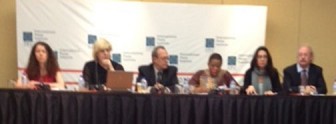A Joint Declaration on Crimes Against Freedom of Expression spanning the United Nations and other agencies requires state officials to desist from statements that increase the vulnerability of journalists and others who are targeted for exercising their right to freedom of expression.
Launched on June 25th in Trinidad and Tobago, on the sidelines of the International Press Institute’s World Congress, the declaration sets out general principles of conduct for states and their officials.

It was attested to by Frank La Rue, UN Special Rapporteur on Freedom of Opinion and Expression; Catalina Botero, OAS Special Rapporteur on Freedom of Expression; Dunja Mijatovic, Organization for Security and Co-operation in Europe (OSCE) Representative on Freedom of the Media and Pansy Tlakula, Special Rapporteur on Freedom of Expression and Access to Information for the African Commission on Human and People’s Rights. In addition to the quartet, the launching press conference was also attended by Barbora Bukovska, senior director for law for Article 19 and Toby Mendel, executive director of the Centre for Law and Democracy.
Among the general principles of the Joint Declaration are that “State officials should unequivocally condemn attacks committed in reprisal for the exercise of freedom of expression and should refrain from making statements that are likely to increase the vulnerability of those who are targeted for exercising their right to freedom of expression.”
It also says that states should reflect in their legal systems that crimes against freedom of expression are particularly serious in so far as they constitute a “direct attack on all fundamental rights.”
It says that this implies that States should:
i. put in place special measures of protection for individuals who are likely to be targeted for what they say where this is a recurring problem;
ii. ensure that crimes against freedom of expression are subject to independent, speedy and effective investigations and prosecutions; and
iii. ensure that victims of crimes against freedom of expression have access to appropriate remedies.
Vultures
The panel was asked by Stabroek News what its response would be to a President who declared journalists to be “vultures” and “carrion crows”.
This question was in reference to a series of attacks launched on the media by President Bharrat Jagdeo last year in the run up to the November 28, 2011 general elections.
Responding first, Mijatovic said “The problem of addressing and calling journalists different names has a chilling effect around the globe.
All four of us (rapporteurs) are fighting with (this)”. Saying that such statements create fear and intimidation, Mijatovic added “I am rather negative about the way elected politicians (behave). They are really not paying any attention to the fact that their words and the way they address journalists and the media is reflecting on the whole of society”.
Contending that the declaration was relevant to statements by heads of state, ministers and members of the executive branch, La Rue said “It is very clear that these statements have a chilling effect and also…and this is where the responsibility comes, those statements also encourage harassment and attacks against journalists because they (the attackers) feel that they will have the acceptance of those in power”. He said he wanted to make it clear that such attacks are “not only statements against journalists but statements against democracy”.
Tlakula said such statements by elected officials constitute intimidation.
Mendel, who has visited Guyana as part of an Article 19 seminar on Access to Information legislation, said that the declaration in its general principles was firm in its outlook that such speech is unacceptable.
The declaration further says that states have an obligation to take measures to prevent crimes against freedom of expression and in specific situations where the authorities know or should have known of the existence of a real and immediate risk of such crimes.
It said that these obligations include the following legal measures:
i. the category of crimes against freedom of expression should be recognised in the criminal law, either explicitly or as an aggravated circumstance leading to heavier penalties for such crimes, taking into account their serious nature; and
ii. crimes against freedom of expression, and the crime of obstructing justice in relation to those crimes, should be subject to either unlimited or extended statutes of limitations (i.e. the time beyond which prosecutions are barred).
Non-legal measures should include training on crimes against freedom of expression, including gender specific crimes for relevant law enforcement officials, including the police and prosecutors, as well, where necessary, military personnel.
The declaration also calls for independent, quick and effective probes.
It said that when a crime against freedom of expression occurs, States should launch speedy and effective probes with the intention to “bringing to trial, before impartial and independent tribunals, both perpetrators and instigators of these crimes.”
It added that the investigation should be conducted by a body that is independent from those implicated in the events.
Further “When there are credible allegations of involvement of State agents, the investigation should be carried out by an authority outside of the jurisdiction or sphere of influence of those authorities, and the investigators should be able to explore all allegations fully.”
As it relates to other stakeholders, the declaration said that media entities should be encouraged to provide adequate safety, risk awareness and self-protection training and guidance to both permanent and freelance workers.




